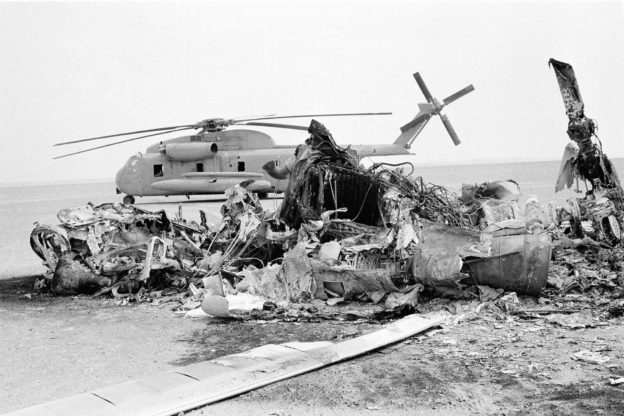Iran was Jimmy Carter’s Waterloo.
Just as Napoleon’s fate was sealed on that bloody Belgian battlefield, so was Mr. Carter’s by the metal and human carnage strewn across Desert One, the area south of Tehran where U.S. special operations forces attempted, and then were forced to abort, the rescue of American hostages held by the just-established Islamic Republic of Iran.
Too much information to process in that sentence? You must be a millennial.
Well, then, some ancient history: Back in 1979, the Shah of Iran, a friend of both the U.S. and Israel, was overthrown (while in the U.S. for medical treatment) by followers of a malevolent Islamist cleric, Ayatollah Ruhollah Khomeini, in what became known as the “Iranian Revolution.” What resulted was the Islamic Republic of Iran, which persists today.
During the turmoil, a group of Iranian students, acting in the name of the revolution, took over the U.S. Embassy in Tehran and held 52 American diplomats and citizens hostage. Anguished, like all Americans, by the situation, then-President Carter attempted and failed to negotiate the hostages’ release. Eventually, he authorized a military rescue operation. On April 2, 1980, the attempt, known as Operation Eagle Claw, failed, resulting in the deaths of eight American servicemen, one Iranian civilian and the destruction of two aircraft – not to mention of any chance Mr. Carter may have had for re-election.
Ronald Reagan won that year’s presidential race, and, in a final insult to Mr. Carter, “Supreme Leader” Khomeini ordered the release of the hostages, who had been held for 444 days, the moment Mr. Reagan concluded his inauguration speech.
Why the history lesson? Because Mr. Carter, who engineered the 1978 Camp David Accords peace agreement between Israel and Egypt, has since become a relentless critic of Israel – and, last week, wrote an op-ed for The New York Times calling on President Obama to officially recognize an Arab state called “Palestine.” “I fear for the spirit of Camp David,” he pleads. “We must not squander this chance.”
The former president, as is his wont, grossly prevaricates, claiming that “most” Palestinians live “under Israeli military rule,” somehow glossing over the more than two million Arabs living under the Palestinian Authority – and the 1.7 million Arabs living under Hamas’ dirty thumb in Gaza. And Mr. Carter is revealing, too, by referring to “600,000 Israeli settlers in Palestine,” a number that can only make sense if one includes all of the Jewish residents of Yerushalayim.
The former president also claims that “Israel is building more and more settlements, displacing Palestinians.” Whatever one may think of the expansion of settlements in Yehudah and Shomron (and I think it is counterproductive), virtually all such communities have been built on fallow land. Palestinians may, legitimately or not, lay claim to some of that land. But “displaced,” like all words, has a meaning.
All in all, Mr. Carter would have done better to have instead written an op-ed for the Arabic daily Al-Quds, the largest circulation paper in the region (whose name is the Arabic one for Yerushalayim, and which once presented “The Protocols of the Elders of Zion” as factual). He could have used some of the same language he employed in his New York Times offering – expressing his “fear for the spirit of Camp David” and declaring that “We must not squander this chance.” But the “chance” would rightly have referred to Israel’s longstanding offer to hold direct, unconditional talks with the P.A., which, to date, Mahmoud Abbas has repeatedly rebuffed. Such talks, of course, would well embody the “spirit of Camp David.”
Most egregious, though, is not what Mr. Carter writes, but what he doesn’t. That would include the unfortunate but most pertinent fact that the “Palestine” whose recognition he urges would be comprised of a fractious populace with at least two mutually antagonistic governments, at least one of which is pledged to the destruction of Israel. No mention, either, in Mr. Carter’s nearly 900 words, of Palestinian terrorism or the declared goal of Islamist groups with enthusiastic adherents in “the territories” to not coexist with Israel but, chalilah, replace her.
Groups like Hamas, Hezbollah and Palestinian Islamic Jihad. And therein lies the irony. Each of those gangs, whose hatred and violence are the true obstacles to peace in Israel and the pacific “Palestine” for which Mr. Carter pines, is generously supplied with weapons and political support by none other than his old nemesis, the Islamic Republic of Iran.
Decades later, in its own way, it’s still making a fool of Jimmy Carter.
© 2016 Hamodia

